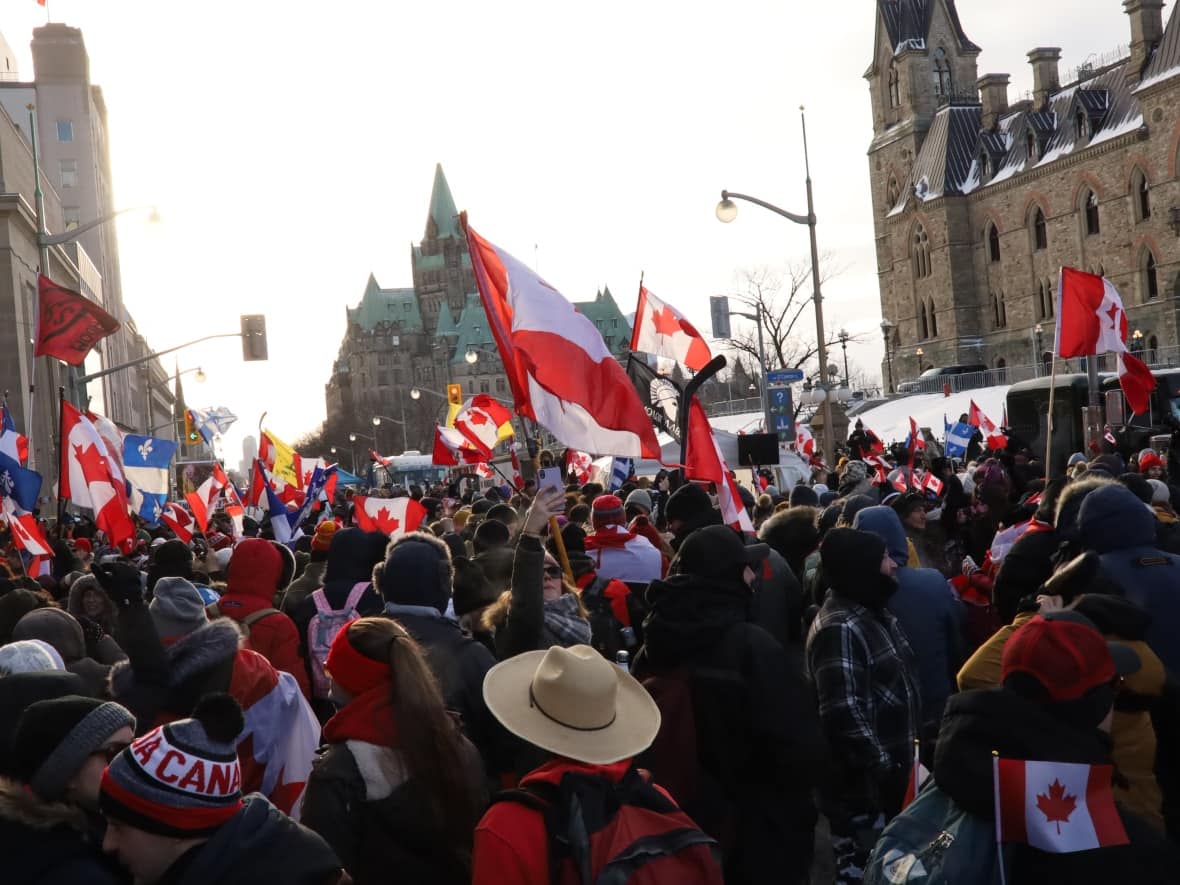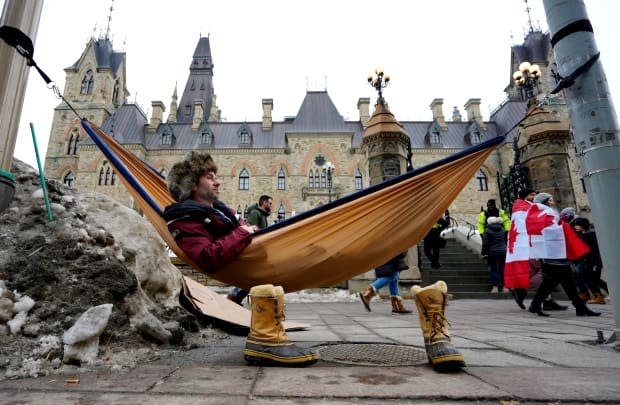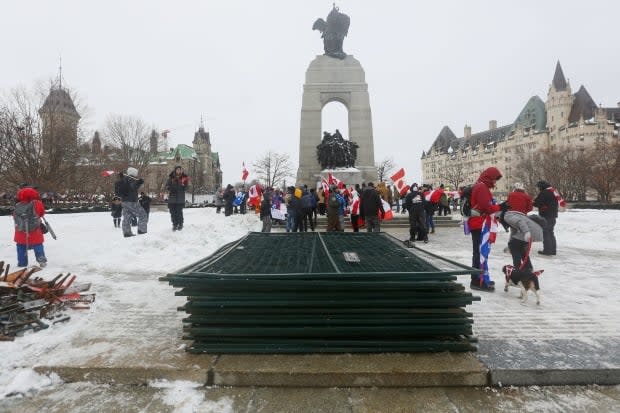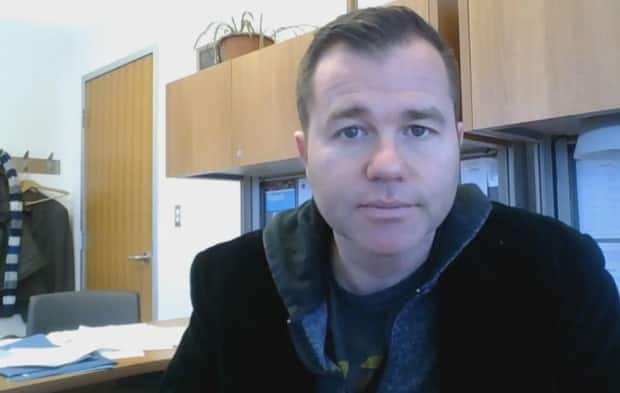Police stand by as anti-mandate protests continue to grip Ottawa

Law enforcement officers in Ottawa appeared helpless on Saturday as vaccine mandate protesters shrugged off the threat of arrest and jail time and pressed on with their raucous demonstration in the city's downtown core.
Police stood by as thousands of demonstrators flooded onto Wellington Street, which runs in front of the Parliament Buildings and the Prime Minister's Office, and other streets in the city centre.
Local police are vastly outnumbered by protesters, who say they aren't going anywhere despite pleas from federal and provincial politicians to go home. Protesters, many adorned with Canadian flags, brazenly defied Prime Minister Justin Trudeau's warning that there would be severe "consequences" for people who continue to block critical infrastructure.
Demonstrators, unimpeded by police, have erected tents, a stage, a large video screen and even a hot tub on this main thoroughfare. Marijuana smoke filled the air and open alcohol containers were commonplace, as the protest has become more like a party for some of the people assembled.
Despite an Ontario court injunction issued last week, a number of trucks blasted their horns throughout the day, frustrating the many local residents who live near the parliamentary precinct.

In a media statement, the Ottawa police said "safety concerns" including "aggressive, illegal behaviour" by demonstrators are to blame for the "limited police enforcement capabilities."
To respond to the "significant influx of demonstrators," the police service said it formed an "integrated command centre" with provincial and federal partners, a new body that it said would "enhance the ability to respond to the current situation."
Police pegged the number of protesters on hand for Saturday's demonstration at roughly 4,000.
Amid the limited police presence, protesters carried away barriers erected around the National War Memorial, originally set up after people jumped on the Tomb of the Unknown Soldier during the protest's first weekend.
Eddie Cornell is a retired warrant officer in the Canadian Armed Forces who was part of the group of protesters that brought down the fencing. Cornell said he helped carry away the barricades because they were a reminder of how Canada isn't free with current public health restrictions introduced to limit the spread of COVID-19.
"All of the veterans here today find it extremely offensive to see a gate around a memorial for people that fought for our freedom a hundred years ago," he said. "When you see a gate around people that fight for freedom, it tells you we're not free," he said.

The organizers behind this movement have encouraged people to bring their children to the site, which has further complicated the police response. Dozens of children are staying in the cabs of some of the big rigs that are parked along Wellington Street and elsewhere.
The Ottawa Police Service claimed early Saturday that it had "a plan to end this unlawful occupation," but as the day progressed, the number of protesters swelled and there was no sign of law enforcement on many of the city's streets. Fifteen days after this demonstration began, Ottawa police have arrested just 26 people.
"People are making a true mockery of this city, province and country. It's just complete and utter lawlessness," Ottawa city councillor Catherine McKenney said in an interview. "Nobody is stepping up to do anything."
McKenney, who represents the Centretown neighbourhood that has been overrun with protesters, said this is a "national crisis" and the federal government's response has been pitiful.
Ottawa has requested 1,800 officers from the OPP and the RCMP to help local police tamp down a protest that has morphed into an occupation. Nearly a week after Ottawa's mayor asked for those reinforcements, the request is still pending.
"We've asked for more resources and we don't get them," McKenney said. "We're being told all laws are being upheld and nobody's getting away with anything, but it's right there in front of us. People are angry in this city today."

Speaking to reporters on Friday, Trudeau said Ottawa's call for help is being "carefully examined" by "experts within the RCMP leadership."
Trudeau said Ottawa police already have enough manpower to put an end to these protests. "I don't accept the contention that the city of Ottawa has exhausted its tools and its resources," he said.
As for criticism that he hasn't done enough to quell unrest in the nation's capital, Trudeau said the federal government will help where appropriate but added it's largely a job for local authorities.
WATCH: Protesters in Ottawa not going anywhere:
Michael Kempa, a criminology professor at the University of Ottawa, said early police inaction has fuelled this movement as demonstrators now feel emboldened to do whatever they want.
"They bungled it. They could've acted earlier," he said of Ottawa police.
But Kempa reserved his harshest criticism for the officials charged with preventing this sort of chaos in the first place.
"The political leadership and the security apparatus of this country are really the forces to blame. Nobody was prepared for this challenge to our national security," he said.
Provincial state of emergency declared
Ontario Premier Doug Ford declared a state of emergency in the province on Friday, in response to the protests against public health measures related to the COVID-19 pandemic. Ford said he would meet with his cabinet to enact orders meant to protect critical infrastructure.
"Fines for non-compliance will be severe, with a maximum penalty of $100,000 and up to a year imprisonment. We will also provide additional authority to consider taking away the personal and commercial licences of anyone who doesn't comply with these orders," the premier said.
WATCH | Ontario premier declares state of emergency:
Ford has called the situation in Ottawa an "occupation" and "siege," but so far the combined efforts of the municipal, provincial and federal governments have not been sufficient to end what each have called illegal actions.
The City of Ottawa has filed for an injunction to complement the provincial orders, similar to one sought by and granted to authorities in Windsor, Ont., late in the week in response to a blockade of the Ambassador Bridge, which links the city to Detroit.
Some action was taken this week to cut off the protesters from consistent funding. An Ontario court issued an order to freeze funds flowing through the fundraising platform GiveSendGo, which contends the court has no jurisdiction over its operations. On Friday, TD Bank froze two personal accounts related to the protests that had received $1.4 million in total — some from a previous GoFundMe campaign and some through bank transfers.
Cabinet minister condemns 'appalling' situation
Federal politicians held an emergency debate on the situation early in the week, with Prime Minister Trudeau saying, "It has to stop." According to his itinerary, Trudeau was set Saturday to hold another meeting of the Incident Response Group — a collection of ministers and senior officials — to discuss the protest.
Interim Conservative leader Candice Bergen called for an end to the Ottawa protest, saying that "the time has come for you to take down the barricades, stop the disruptive action and come together." Bergen and other Conservatives had been supportive of the protest in its earlier stages.
Intergovernmental Affairs Minister Dominic LeBlanc said federal ministers had been working with their provincial and municipal colleagues to provide support for enforcement actions.
LISTEN | Intergovernmental affairs minister on ongoing protests:
"What we're responsible for doing is encouraging the lawful authorities, the competent authorities to enforce the law and, frankly, to end what is an appalling and illegal circumstance," he said in an interview on CBC's The House that aired on Saturday.
Jurisdictional issues have plagued the response to protests so far, in Ottawa and elsewhere, but LeBlanc told host Chris Hall they could not simply be waved away.
"Whether or not it's convenient or pleasant," the federal government cannot act unilaterally on streets and highways that are provincial jurisdiction, he said.
"That doesn't mean that we shouldn't work to find a solution to end this appalling circumstance as quickly as possible, but it speaks to the lawful authority. The RCMP are not able to simply roll on to a street in downtown Windsor, or even counterintuitively in downtown Ottawa, and undertake what is properly a municipal policing function," LeBlanc said.
Amid the jurisdictional squabbling, Catherine McKenna, a former Liberal cabinet colleague of LeBlanc and an MP for the area, said the government's handling of these demonstrations has been "appalling."
"This isn't just Ottawa, it's the nation's capital. But no one — not the city, the province, or the federal government — can seem to get their act together to end this illegal occupation," she said in a social media post.
"No one wants to hear excuses from politicians or how it's someone else's jurisdiction. Just get your act together. Now," she said. "Leaders lead."
Along with Windsor and Ottawa, protesters were active on the weekend in Toronto, Kingston, Ont., and other cities across the country, including Winnipeg and Edmonton. A protest blocking the border near Coutts, Alta., also continued over the weekend, with the Canada Border Services Agency halting activity there due to the demonstration.
Restrictions beginning to ease
Several premiers announced this week the easing of public health measures related to the pandemic, including Jason Kenney in Alberta and Scott Moe in Saskatchewan.
In Ontario, officials are reviewing public health measures, though the province's chief medical officer of health, Dr. Kieran Moore, said the province is maintaining a "gradual approach."
Meanwhile, sources told CBC News the federal government is close to removing mandatory molecular testing requirements for fully vaccinated Canadians entering the country.
LeBlanc denied that the federal government was acting under pressure from the protests, saying the "evolution" in public health measures was driven by advice from experts.
"A bunch of people occupying downtown Ottawa and shouting insults at people wearing masks, or walking around with offensive and hateful symbols, actually doesn't constitute medical advice or a clinical trial," he said.


